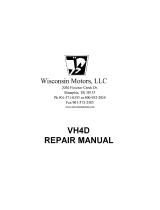4-6
DRIVING
SHAFT
(P.T.O.
shaft)
(for
Model B
only)
The driving shaft is made
of
forged carbon steel and reduction gear
is
force-fitted.
4-7 CYLINDER
‘Model
EC05-2, EC07-2
Monoblock cylinder and cylinder head .is made
of
aluminum alloy diecasting and-inside the cylinder is treated with
hard-chromium plating
to
withstand against the wear by reciprocal motion
of
the piston.
Outside fins
of
cylinder-head are arranged to get efficient heat dispersion and provided with threaded hole for mounting a
spark plug on the top.
Inside the cylinder, one each of intake port, exhaust port and two scavenging ports are positioned to get the maximum
engine performance.
-.
Model
ECIO, EC17
The cylinder is made
of
precision-casted wear-resistant cast iron provided with fins for perfect heat dispersion.
Inside the cylinder, one each
of
intake
port,
exhaust port and two scavenging ports are positioned to get the maximum
engine performance.
The cylinder is attached
to
the crankcase with the flange, which positioned lower part of cylinder, by stud-bolts.
*Model
EC25-2
The cylinder
with
the cylinder liner
is
made of aluminium alloy. The cylinder liner
is
made of special cast iron and are
im-
bedded
in
the
aluminium casting as inserts. Inside the cylinder, one each
of
intake port, exhaust port and four scavenging
ports are positioned
to
the maximum engine performance.
4-8
CYLINDER HEAD
(Model
ECIO,
17,25-2
only)
The cylinder head is made
of
heat-conductive aluminum alloy and is provided with the fins, arranged in the direction
of
cooling air to achieve the efficient cooling.
The combusion chamber forms semi- spherical and is provided with threaded hole for mounting a spark-plug on the top.
4-9 GOVERNOR
The centrifugal flyweight type governor assures constantspeed operation at selected speed, irrespective
of
load fluctuations.
(The governor is built-in the crankcase for Model
EC05-2,07-2)
As
to the detail, refer to section
“8.
GOVERNOR”.
4-10 COOLING
The cooling fan which also serves as a flywheel forcily feeds cooling air to the cylinder and cylinder head with the aid
of
blower housing and air buffle.
4-11 IGNITION
The ignition system
is
of
flywheel magneto type with ignition timing set at
23”
before TDC
for
EC05-2, 07-2, 25-2, 18” be-
fore TDC for EC10 and
22”
before TDC for EC 17 respectively.
The flywheel with steel magnet piece revolves outside the coil and generates the electric power
in
the coil. The flywheel
also
equalize the engine revolution and at the same time,
it
serves as a blower, with its impellers on the circumstance, for cooling
the
engine. The igntition coil and the breaker are mounted
in
the crankcase.
As
to
the detail, refer to “Section
7.
MAGNETO”.
-15-






















